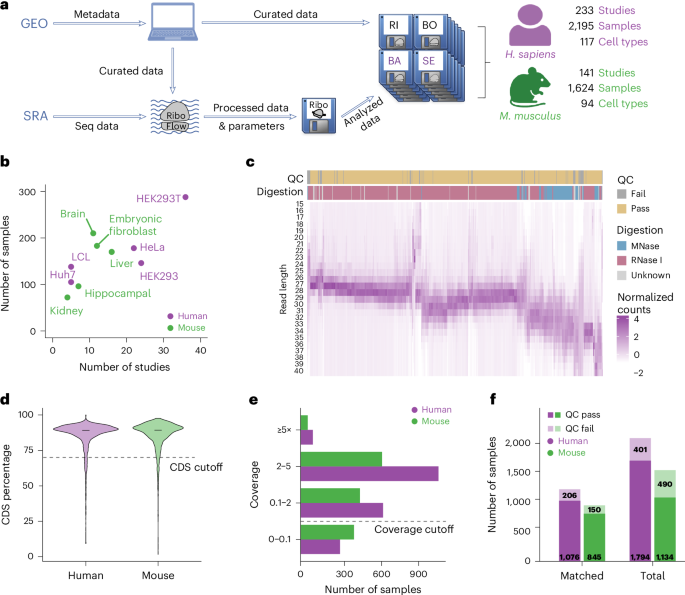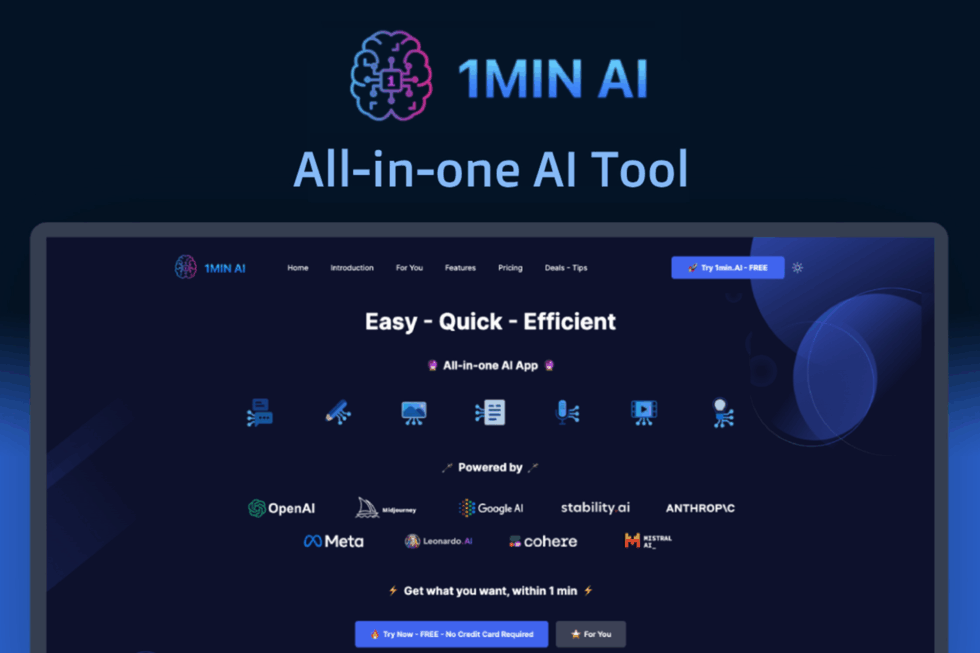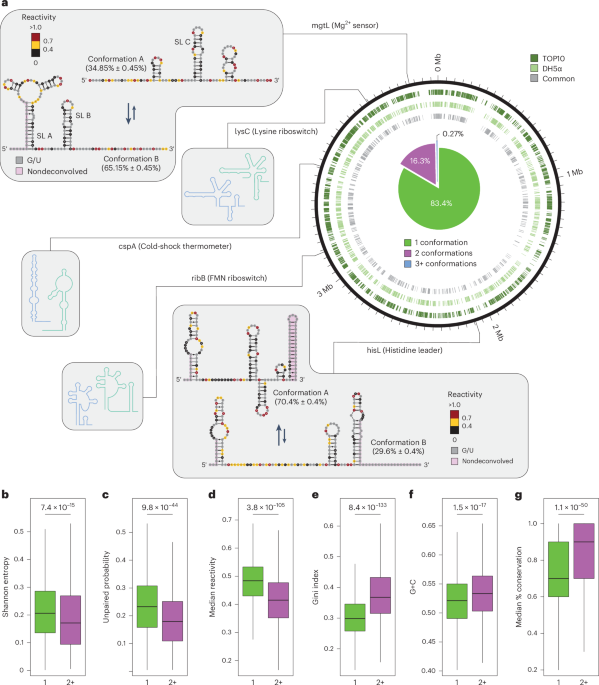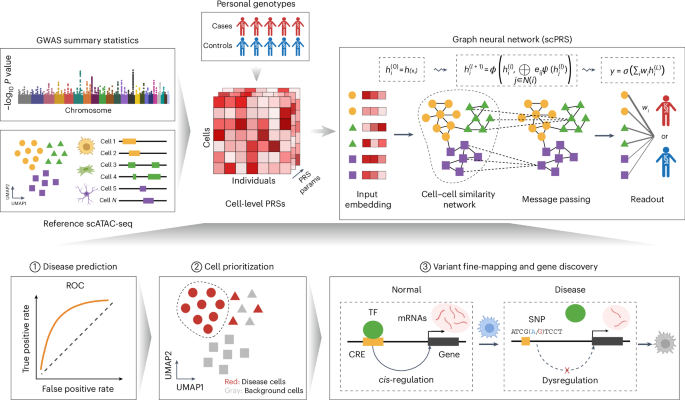Now Reading: Study Uncovers Conserved Translation Efficiency Patterns Across Cell Types
-
01
Study Uncovers Conserved Translation Efficiency Patterns Across Cell Types
Study Uncovers Conserved Translation Efficiency Patterns Across Cell Types

Rapid Summary:
- The raw article text references a series of scientific papers concerning advancements in RNA sequencing, protein interactions, single-cell transcriptomics, spatial mapping of gene expression data, adn computational methodologies for genomic studies.
- Key topics include mRNA-seq analysis techniques (Tang et al., Mortazavi et al.), transcriptional landscapes using yeast genome (Nagalakshmi et al.), imaging methods for RNA profiling (Chen et al.), algorithms predicting protein functions at genomic scale (Marcotte et al.), and exploring gene co-expression networks globally (Stuart et al.).
- Study methodologies involve complementary DNA microarrays, cryo-sliced samples for spatial patterns (Combs & Eisen), weighted correlation network analysis packages like WGCNA, and cluster analyses to discover conserved genetic modules.
- technologies are directed toward advancing biotechnology fields with higher precision in transcriptome mapping and integration with protein-protein interaction datasets.
Indian Opinion Analysis:
India has been steadily advancing in the field of biotechnology and genomics research while relying heavily on international collaborations or adopting cutting-edge Western-developed technologies such as RNA sequencing or single-cell transcriptomics. The context provided by these citations showcases the evolution of tools that can revolutionize modern research efforts not only globally but also within India’s competitive scientific landscape. With Indian institutes increasingly focusing on bioinformatics software development and computational biology initiatives such as genome sequencing projects or healthcare innovation hubs, integrating complex methods like those discussed here could yield transformative results for domestic healthcare systems.
Moreover, this underscores the need for expanding India’s technical workforce skilled in next-gen computational analytics-tools similar to R packages mentioned above-and enhancing its capacity to conduct primary research independently rather then remaining primarily an adapter in global biotechnology ecosystems. Policymakers might consider investing further into foundational scientific education concurrent with high-tech infrastructure upgrades that place Indian science at global frontiers.
Read moreIt appears the input is a list of academic references rather than a news article about India. If you can provide the specific raw text of an Indian news article, I will be able to craft both a Quick Summary and Indian Opinion Analysis for you accordingly. Please share the relevant text!Quick Summary:
- The article discusses various advancements and studies in genomics, proteomics, and related fields.
- Research areas include ribosome profiling, evolutionary constraints on protein assembly, RNA-seq data analysis across species, and genome-wide translation analysis.
- ribosome profiling methods have improved to achieve single-codon resolution in bacterial systems.
- Studies highlight co-evolution of transcriptomes and translatomes in mammals as well as post-transcriptional buffering mechanisms observed in yeast.
Indian Opinion Analysis:
The growing body of research on genomics and proteomics underscores the importance of high-resolution techniques like ribosome profiling to understand genetic expression at deeper levels. For India, relying on such advanced research methodologies can foster growth in biotechnology sectors such as pharmaceuticals and agricultural innovation. Moreover,a better understanding of evolutionary constraints might help develop treatments for genetic disorders specific to Indian demographics. India’s focus should be not only on adopting these technologies but also creating partnerships with global research communities for knowledge sharing.
Read more: Nature ArticleQuick Summary
- The news covers advancements in understanding RNA-binding proteins (RBPs) and their regulatory mechanisms in diverse biological processes.
- Insights include RBPs’ role in gene co-expression across species,regulation of mRNA translation via pathways like mTORC1,and impacts on diseases such as melanoma metastasis and colorectal cancer progression.
- Notable developments emphasize how RBPs influence molecular systems, genomic context analysis, transcription factor binding motifs with associated genes, and microRNA interactions.
Indian Opinion Analysis
This research highlights the global significance of RNA-related studies but also presents implications specifically for India’s biotechnology sector. With India’s growing investments in genomics and its aspiration to be a leader in medical research innovations, clarity on RNA-binding proteins could aid advances in disease diagnostics or therapeutics-perhaps benefitting efforts to combat cancer or neurodegenerative disorders prevalent domestically. Broad recognition of essential molecular insights may also deepen India’s contributions to international bioscience collaborations.
Read more: Nature Article Link
Quick Summary
- The article discusses various scientific studies related to cellular biology and molecular functions.
- Topics covered include the extracellular matrix, lysyl oxidase, and DNMT1 activation mechanisms.
- Other highlighted research focuses on gastric cancer metastasis, colorectal cancer growth dependent on PLEKHA7 signaling, neural progenitor delamination in the neocortex, protein recognition motifs like leucine-rich repeats, and co-regulation mapping in the human proteome.
- References provided include notable journals such as Nature, Cell, and J. Biol. Chem..
Indian Opinion Analysis
India has made critically important strides in contributing to bioscience research globally. These studies reflect cutting-edge progress that resonates with India’s aspirations for innovation within biotechnology and healthcare sectors. For policymakers or researchers domestically looking into these explorations-for example targeting cancer treatments or neural developmental disorders-this knowledge base could inspire further examination adapted to local challenges such as scalable healthcare solutions tailored for diverse populations across urban-rural landscapes.
Link: Click for more detailsQuick Summary
- This article discusses advanced techniques in proteomics and transcriptional studies.
- Major focus is on mapping protein-protein interactions, improving translation efficiency, and understanding gene expression dynamics.
- Key studies highlighted include: large-scale proteomic experiments (PaxDb 4.0), ribosome profiling for translation dynamics, enzyme stoichiometry in evolution, effects of mRNA decay on protein synthesis, and glycolysis preservation mechanisms aiding metastasis progression.
- References range across diverse global datasets integrated from multiple organisms to explain biological systems effectively.
Indian Opinion Analysis
India’s biotechnology sector can leverage findings presented here to accelerate advancements in genomic medicine and personalized health solutions. The integration of large proteomic databases with functional insights into protein synthesis could align with India’s growing initiatives in drug finding platforms and cancer research. Establishing international collaborations may further bolster the country’s ability to incorporate these tools into existing frameworks like genomics-driven healthcare or the development of therapeutic strategies for complex diseases like colorectal cancer or hepatocellular carcinoma.
For Read More: [Given Link]Quick Summary:
- The raw data references studies and developments related to RNA-binding proteins, protein interactions, ribosome profiling, and computational tools for analyzing gene expression.
- Scientific advancements are noted within global contexts such as alphafold for protein structures and databases like oRNAment targeting transcriptomes.
- Key publications examine genetic translation mechanisms impacted by factors like SARS-CoV-2 Nsp1 protein or translational pausing during cellular stress.
Indian Opinion analysis:
These international scientific findings hold potential significance for India’s biotechnology sector and research development initiatives. Insights into areas such as RNA-protein interactions or advanced computational platforms could bolster Indian efforts in genomic medicine, agricultural bioengineering, or pandemic response strategies.Encouraging interdisciplinary collaborations might position India to leverage these breakthroughs towards socio-economic benefits while addressing challenges inherent in translating global research models to local contexts.
Read more: click hereQuick Summary:
- The raw text provided appears to consist of references related to molecular biology and computational analysis research, with examples spanning RNA sequencing, gene regulation, data analysis methods, and software tools.
- there is no direct mention of any India-specific event or occurrence in the supplied source text.
Indian Opinion Analysis:
The references presented seem focused on biological and computational research and highlight global efforts in genomics and data analysis.these fields are increasingly significant for India as it aims to become a leader in biotechnology innovation. The pursuit of advanced understanding in genomic sciences aligns with India’s strategic goals for health technology improvement, especially considering India’s extensive biodiversity which serves as a powerful resource for genetic studies. Investments into these domains could bolster India’s scientific standing while contributing solutions not only domestically but globally.
Read more: Given the context provided lacks specific details related to India directly (the fast links added above).quick Summary:
- the referenced article explores tunable and dynamic characteristics of 5′TOP motifs,which are involved in translation regulation.
- Research tools utilized include LARP1 translation target analysis, protein structure prediction with AlphaFold, and functional gene network analysis using EGAD/BEDTools.
- Studies reviewed also focus on paralog data mining (Paralog Explorer), genome annotation for human/mouse data packages, and CRISPR-Cas9 genetic screen optimization methodologies.
- Publications cited cover advances in computational biology such as CRISPR screening libraries, genomic comparative utilities like BEDTools, and database resources including UniProt.
Indian Opinion Analysis:
The topics tackled by the study have significance for India’s strong emerging role in science and technology.With advancements such as CRISPR-based edits being increasingly used globally for medical innovations, research like this could pave opportunities for Indian scientists to enhance genomics-centered solutions tailored to local challenges (e.g., healthcare applications or biodiversity). The integration of computational tools showcases a growing reliance on AI-driven approaches-a frontier where India has been building capacity. Neutral observation suggests promoting cross-disciplinary collaboration between conventional biology expertise within the country coupled with India’s rapidly expanding IT innovation ecosystem may yield greater returns.


























